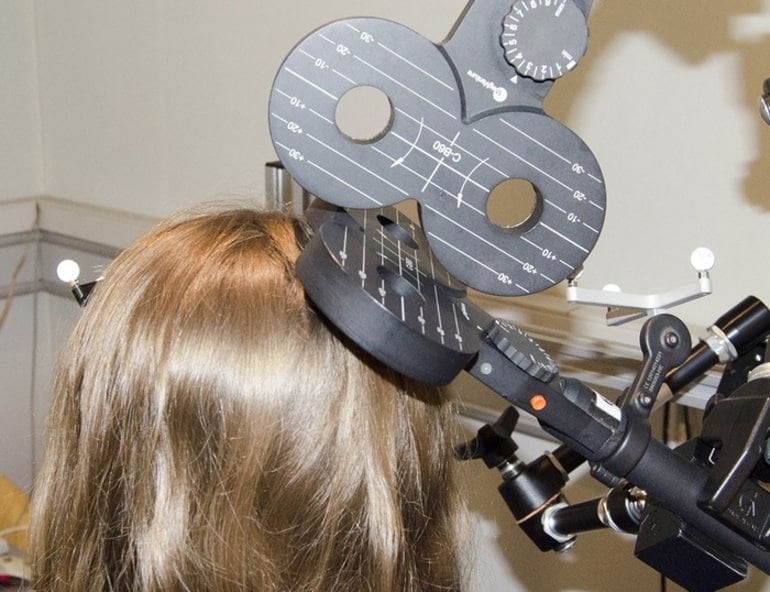Summary: A transcranial magnetic stimulation study revealed the motor cortex may play a role in translating foreign language words into one’s native tongue.
Source: TUD
The motor cortex is a brain region known to control the body’s voluntary movements. However, the team of neuroscientists have now shown that it can also help translating foreign language words into one’s native language.
Their study has been published recently in the renowned Journal of Neuroscience.
The study
Participants in the study learned foreign language words by performing semantically-related gestures over four days of training. After the training, the participants heard the words that they had learned and were asked to translate them into their native language.
A neuroscience technique known as transcranial magnetic stimulation (TMS), in which magnetic pulses stimulate specific brain areas, was used to interfere with processing in the motor cortex during the translation task.
The scientists found that this interference slowed down the translation of words learned with gestures. This slowing was not observed in response to the control TMS, which does not interfere with motor cortex processing.

In an additional control condition, participants learned foreign language words by viewing pictures, whose translation was unaffected by TMS applied to the motor cortex.
The results
The motor cortex contributed to the translation of foreign language vocabulary after a relatively brief period of gesture-based training, suggesting that performing gestures may be a valuable tool for picking up new words in a foreign language more quickly.
“Interestingly, the effect occurred for both concrete words such as violin and abstract words such as democracy. Taken together, the findings suggest that our memory for recently-learned foreign language words depends on the sensorimotor context in which the words were experienced during learning,” explains first author Brian Mathias.
“Many often-used teaching methods for learning new foreign language vocabulary rely on only audio or visual information, such as studying written word lists. Our findings shed light on why learning techniques that integrate the body’s motor system typically outperform these other learning strategies.”
About this language learning research news
Author: Anne-Stephanie Vetter
Source: TUD
Contact: Anne-Stephanie Vetter – TUD
Image: The image is credited to Chair of Cognitive and Clinical Neuroscience/TUD
Original Research: Closed access.
“Motor cortex causally contributes to vocabulary translation following sensorimotor-enriched training” by Brian Mathias, Andrea Waibel, Gesa Hartwigsen, Leona Sureth, Manuela Macedonia, Katja M. Mayer and Katharina von Kriegstein. Journal of Neuroscience
Abstract
Motor cortex causally contributes to vocabulary translation following sensorimotor-enriched training
The role of the motor cortex in perceptual and cognitive functions is highly controversial. Here, we investigated the hypothesis that the motor cortex can be instrumental for translating foreign language vocabulary.
Human participants of both sexes were trained on foreign language (L2) words and their native language translations over four consecutive days. L2 words were accompanied by complementary gestures (sensorimotor enrichment) or pictures (sensory enrichment). Following training, participants translated the auditorily-presented L2 words that they had learned.
During translation, repetitive transcranial magnetic stimulation (rTMS) was applied bilaterally to a site within the primary motor cortex (Brodmann Area 4) located in the vicinity of the arm functional compartment. Responses within the stimulated motor region have previously been found to correlate with behavioral benefits of sensorimotor-enriched L2 vocabulary learning.
Compared to sham stimulation, effective perturbation by rTMS slowed down the translation of sensorimotor-enriched L2 words—but not sensory-enriched L2 words. This finding suggests that sensorimotor-enriched training induced changes in L2 representations within the motor cortex, which in turn facilitated the translation of L2 words.
The motor cortex may play a causal role in precipitating sensorimotor-based learning benefits, and may directly aid in remembering the native language translations of foreign language words following sensorimotor-enriched training.
These findings support multisensory theories of learning while challenging reactivation-based theories.
Significance Statement
Despite the potential for sensorimotor enrichment to serve as a powerful tool for learning in many domains, its underlying brain mechanisms remain largely unexplored.
Using transcranial magnetic stimulation and a foreign language (L2) learning paradigm, we found that sensorimotor-enriched training can induce changes in L2 representations within the motor cortex, which in turn causally facilitate the translation of L2 words.
The translation of recently-acquired L2 words may therefore rely not only on auditory information stored in memory or on modality-independent L2 representations, but also on the sensorimotor context in which the words have been experienced.







